Analysing Organisational Behaviour and Culture within BBC
VerifiedAdded on 2024/06/27
|20
|4383
|378
Report
AI Summary
This report provides a comprehensive analysis of the organisational behaviour at BBC, focusing on the impact of culture, power, and politics on employee behaviour. It examines the earlier organisational culture within BBC using Handy’s cultural typology, discussing power culture, role culture, task culture, and person culture. The report further explores how culture, power, and politics have affected behaviour in the BBC in recent past and today, highlighting issues such as sexual harassment and staff turnover. Additionally, it provides examples of how content and process theories of motivation, along with other motivational techniques, may have helped to improve effectiveness in teams within the BBC, emphasizing Maslow's theory and Vroom's expectancy theory. Finally, the report discusses how improved levels of motivation within the BBC can help to achieve its organizational goals through theories like Herzberg's theory and goal setting theory. Desklib offers a range of solved assignments and resources for students.
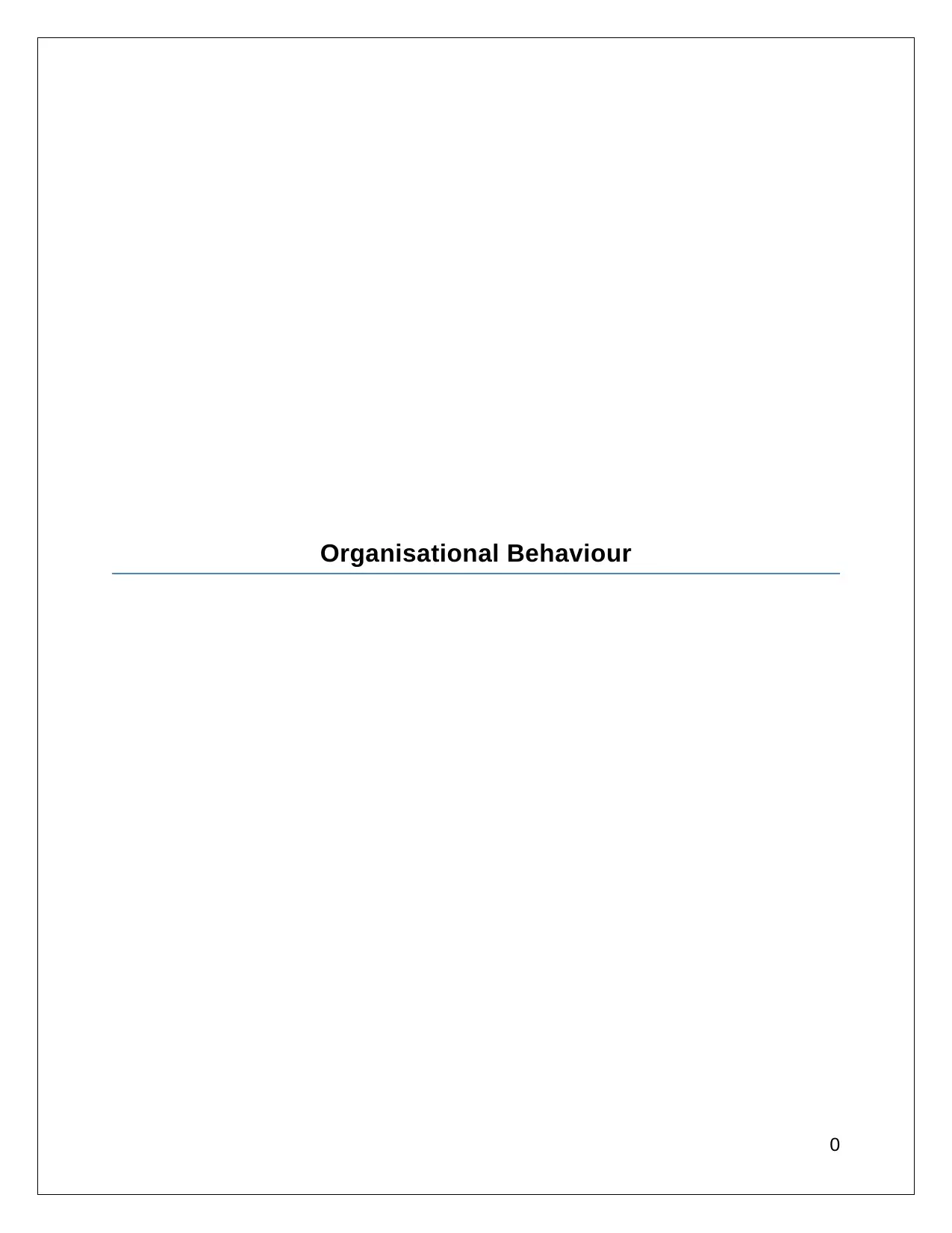
Organisational Behaviour
0
0
Paraphrase This Document
Need a fresh take? Get an instant paraphrase of this document with our AI Paraphraser
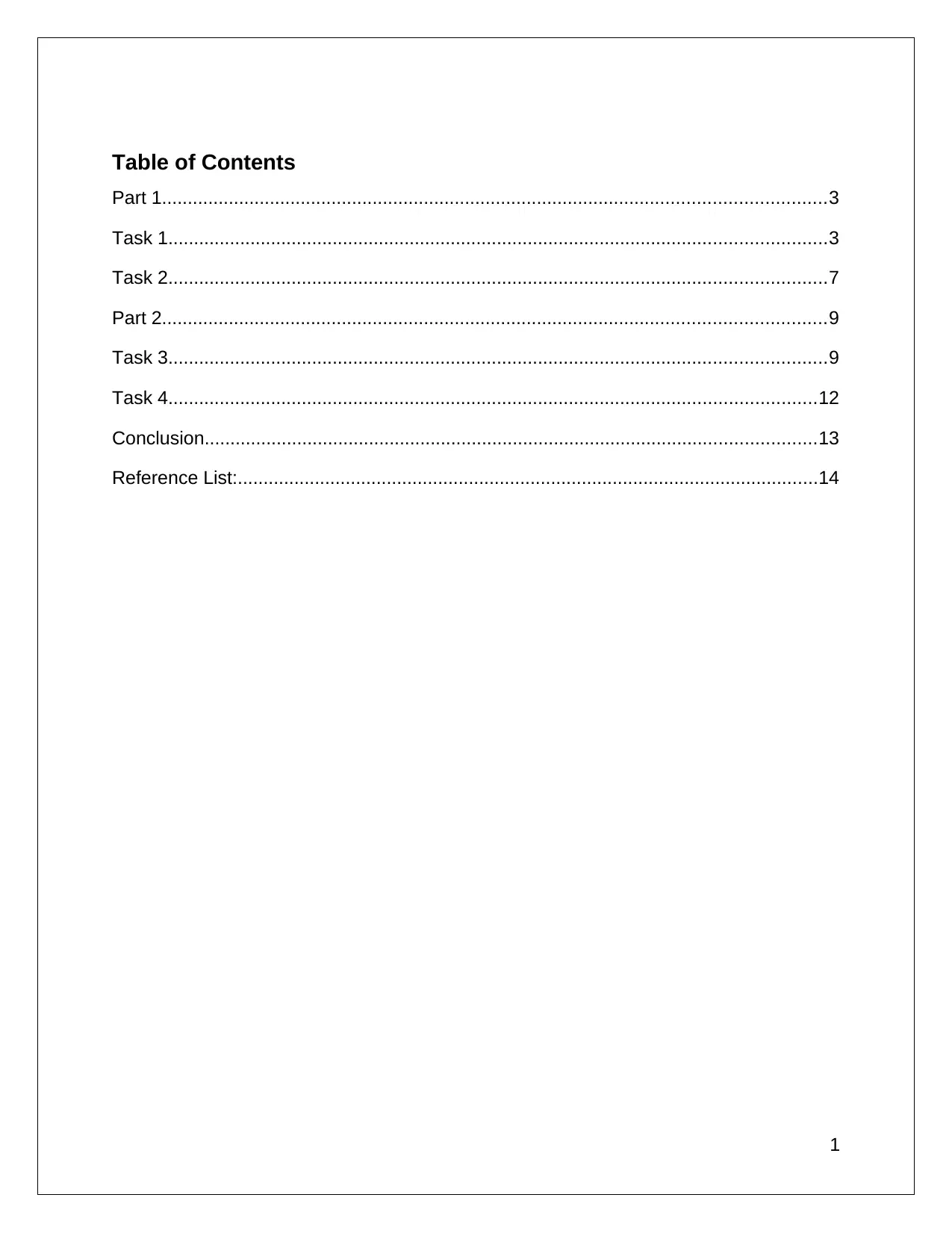
Table of Contents
Part 1.................................................................................................................................3
Task 1................................................................................................................................3
Task 2................................................................................................................................7
Part 2.................................................................................................................................9
Task 3................................................................................................................................9
Task 4..............................................................................................................................12
Conclusion.......................................................................................................................13
Reference List:.................................................................................................................14
1
Part 1.................................................................................................................................3
Task 1................................................................................................................................3
Task 2................................................................................................................................7
Part 2.................................................................................................................................9
Task 3................................................................................................................................9
Task 4..............................................................................................................................12
Conclusion.......................................................................................................................13
Reference List:.................................................................................................................14
1
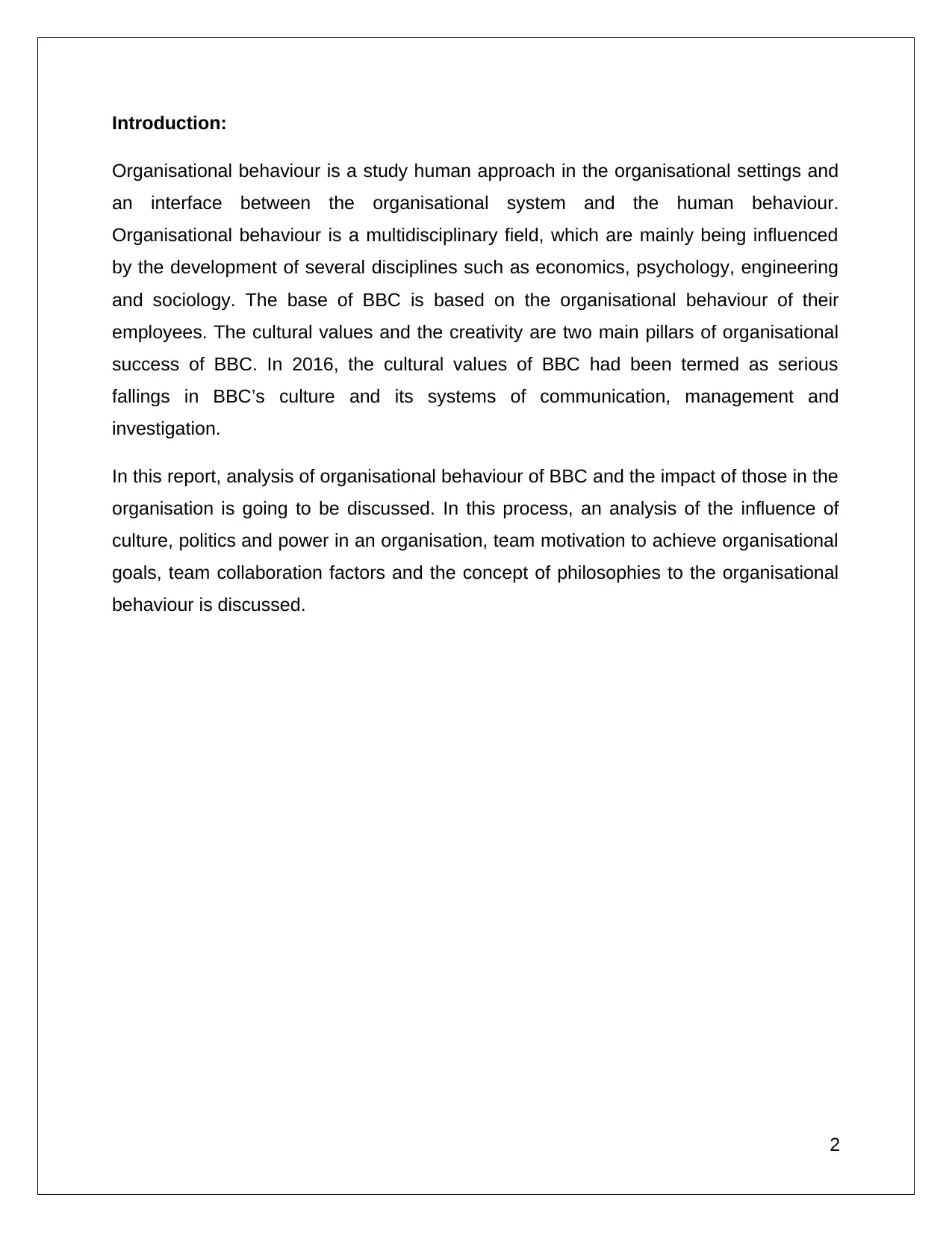
Introduction:
Organisational behaviour is a study human approach in the organisational settings and
an interface between the organisational system and the human behaviour.
Organisational behaviour is a multidisciplinary field, which are mainly being influenced
by the development of several disciplines such as economics, psychology, engineering
and sociology. The base of BBC is based on the organisational behaviour of their
employees. The cultural values and the creativity are two main pillars of organisational
success of BBC. In 2016, the cultural values of BBC had been termed as serious
fallings in BBC’s culture and its systems of communication, management and
investigation.
In this report, analysis of organisational behaviour of BBC and the impact of those in the
organisation is going to be discussed. In this process, an analysis of the influence of
culture, politics and power in an organisation, team motivation to achieve organisational
goals, team collaboration factors and the concept of philosophies to the organisational
behaviour is discussed.
2
Organisational behaviour is a study human approach in the organisational settings and
an interface between the organisational system and the human behaviour.
Organisational behaviour is a multidisciplinary field, which are mainly being influenced
by the development of several disciplines such as economics, psychology, engineering
and sociology. The base of BBC is based on the organisational behaviour of their
employees. The cultural values and the creativity are two main pillars of organisational
success of BBC. In 2016, the cultural values of BBC had been termed as serious
fallings in BBC’s culture and its systems of communication, management and
investigation.
In this report, analysis of organisational behaviour of BBC and the impact of those in the
organisation is going to be discussed. In this process, an analysis of the influence of
culture, politics and power in an organisation, team motivation to achieve organisational
goals, team collaboration factors and the concept of philosophies to the organisational
behaviour is discussed.
2
⊘ This is a preview!⊘
Do you want full access?
Subscribe today to unlock all pages.

Trusted by 1+ million students worldwide
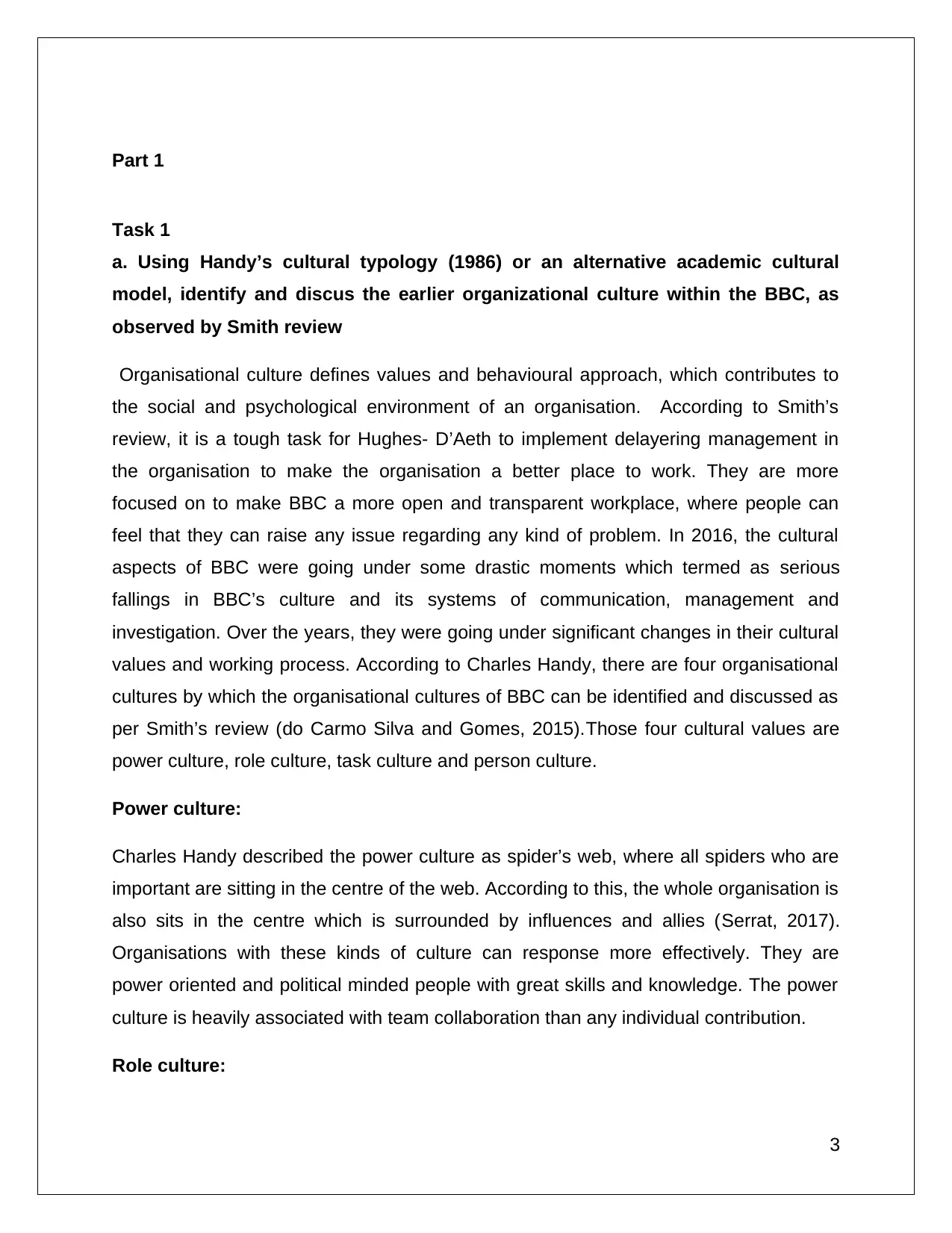
Part 1
Task 1
a. Using Handy’s cultural typology (1986) or an alternative academic cultural
model, identify and discus the earlier organizational culture within the BBC, as
observed by Smith review
Organisational culture defines values and behavioural approach, which contributes to
the social and psychological environment of an organisation. According to Smith’s
review, it is a tough task for Hughes- D’Aeth to implement delayering management in
the organisation to make the organisation a better place to work. They are more
focused on to make BBC a more open and transparent workplace, where people can
feel that they can raise any issue regarding any kind of problem. In 2016, the cultural
aspects of BBC were going under some drastic moments which termed as serious
fallings in BBC’s culture and its systems of communication, management and
investigation. Over the years, they were going under significant changes in their cultural
values and working process. According to Charles Handy, there are four organisational
cultures by which the organisational cultures of BBC can be identified and discussed as
per Smith’s review (do Carmo Silva and Gomes, 2015).Those four cultural values are
power culture, role culture, task culture and person culture.
Power culture:
Charles Handy described the power culture as spider’s web, where all spiders who are
important are sitting in the centre of the web. According to this, the whole organisation is
also sits in the centre which is surrounded by influences and allies (Serrat, 2017).
Organisations with these kinds of culture can response more effectively. They are
power oriented and political minded people with great skills and knowledge. The power
culture is heavily associated with team collaboration than any individual contribution.
Role culture:
3
Task 1
a. Using Handy’s cultural typology (1986) or an alternative academic cultural
model, identify and discus the earlier organizational culture within the BBC, as
observed by Smith review
Organisational culture defines values and behavioural approach, which contributes to
the social and psychological environment of an organisation. According to Smith’s
review, it is a tough task for Hughes- D’Aeth to implement delayering management in
the organisation to make the organisation a better place to work. They are more
focused on to make BBC a more open and transparent workplace, where people can
feel that they can raise any issue regarding any kind of problem. In 2016, the cultural
aspects of BBC were going under some drastic moments which termed as serious
fallings in BBC’s culture and its systems of communication, management and
investigation. Over the years, they were going under significant changes in their cultural
values and working process. According to Charles Handy, there are four organisational
cultures by which the organisational cultures of BBC can be identified and discussed as
per Smith’s review (do Carmo Silva and Gomes, 2015).Those four cultural values are
power culture, role culture, task culture and person culture.
Power culture:
Charles Handy described the power culture as spider’s web, where all spiders who are
important are sitting in the centre of the web. According to this, the whole organisation is
also sits in the centre which is surrounded by influences and allies (Serrat, 2017).
Organisations with these kinds of culture can response more effectively. They are
power oriented and political minded people with great skills and knowledge. The power
culture is heavily associated with team collaboration than any individual contribution.
Role culture:
3
Paraphrase This Document
Need a fresh take? Get an instant paraphrase of this document with our AI Paraphraser
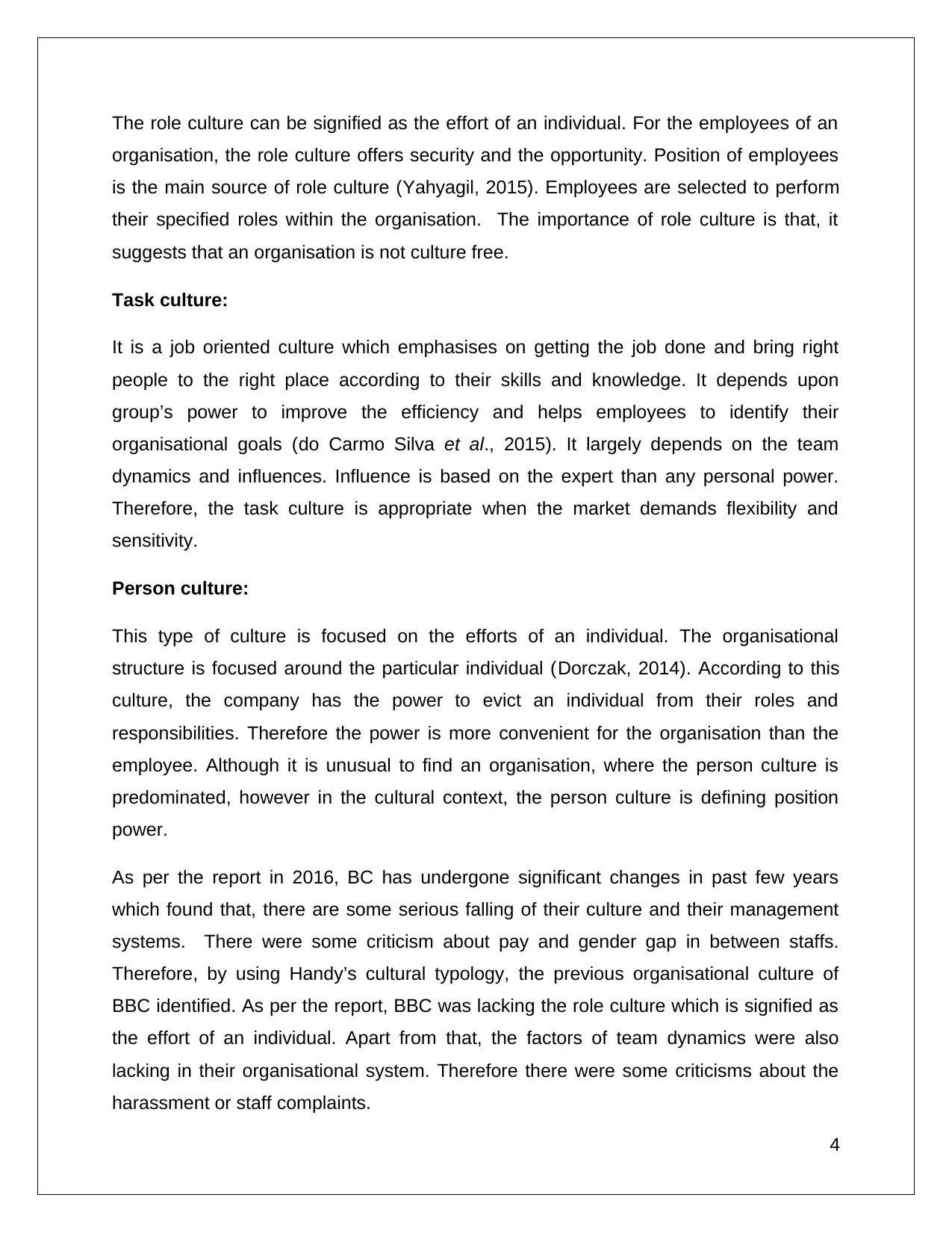
The role culture can be signified as the effort of an individual. For the employees of an
organisation, the role culture offers security and the opportunity. Position of employees
is the main source of role culture (Yahyagil, 2015). Employees are selected to perform
their specified roles within the organisation. The importance of role culture is that, it
suggests that an organisation is not culture free.
Task culture:
It is a job oriented culture which emphasises on getting the job done and bring right
people to the right place according to their skills and knowledge. It depends upon
group’s power to improve the efficiency and helps employees to identify their
organisational goals (do Carmo Silva et al., 2015). It largely depends on the team
dynamics and influences. Influence is based on the expert than any personal power.
Therefore, the task culture is appropriate when the market demands flexibility and
sensitivity.
Person culture:
This type of culture is focused on the efforts of an individual. The organisational
structure is focused around the particular individual (Dorczak, 2014). According to this
culture, the company has the power to evict an individual from their roles and
responsibilities. Therefore the power is more convenient for the organisation than the
employee. Although it is unusual to find an organisation, where the person culture is
predominated, however in the cultural context, the person culture is defining position
power.
As per the report in 2016, BC has undergone significant changes in past few years
which found that, there are some serious falling of their culture and their management
systems. There were some criticism about pay and gender gap in between staffs.
Therefore, by using Handy’s cultural typology, the previous organisational culture of
BBC identified. As per the report, BBC was lacking the role culture which is signified as
the effort of an individual. Apart from that, the factors of team dynamics were also
lacking in their organisational system. Therefore there were some criticisms about the
harassment or staff complaints.
4
organisation, the role culture offers security and the opportunity. Position of employees
is the main source of role culture (Yahyagil, 2015). Employees are selected to perform
their specified roles within the organisation. The importance of role culture is that, it
suggests that an organisation is not culture free.
Task culture:
It is a job oriented culture which emphasises on getting the job done and bring right
people to the right place according to their skills and knowledge. It depends upon
group’s power to improve the efficiency and helps employees to identify their
organisational goals (do Carmo Silva et al., 2015). It largely depends on the team
dynamics and influences. Influence is based on the expert than any personal power.
Therefore, the task culture is appropriate when the market demands flexibility and
sensitivity.
Person culture:
This type of culture is focused on the efforts of an individual. The organisational
structure is focused around the particular individual (Dorczak, 2014). According to this
culture, the company has the power to evict an individual from their roles and
responsibilities. Therefore the power is more convenient for the organisation than the
employee. Although it is unusual to find an organisation, where the person culture is
predominated, however in the cultural context, the person culture is defining position
power.
As per the report in 2016, BC has undergone significant changes in past few years
which found that, there are some serious falling of their culture and their management
systems. There were some criticism about pay and gender gap in between staffs.
Therefore, by using Handy’s cultural typology, the previous organisational culture of
BBC identified. As per the report, BBC was lacking the role culture which is signified as
the effort of an individual. Apart from that, the factors of team dynamics were also
lacking in their organisational system. Therefore there were some criticisms about the
harassment or staff complaints.
4
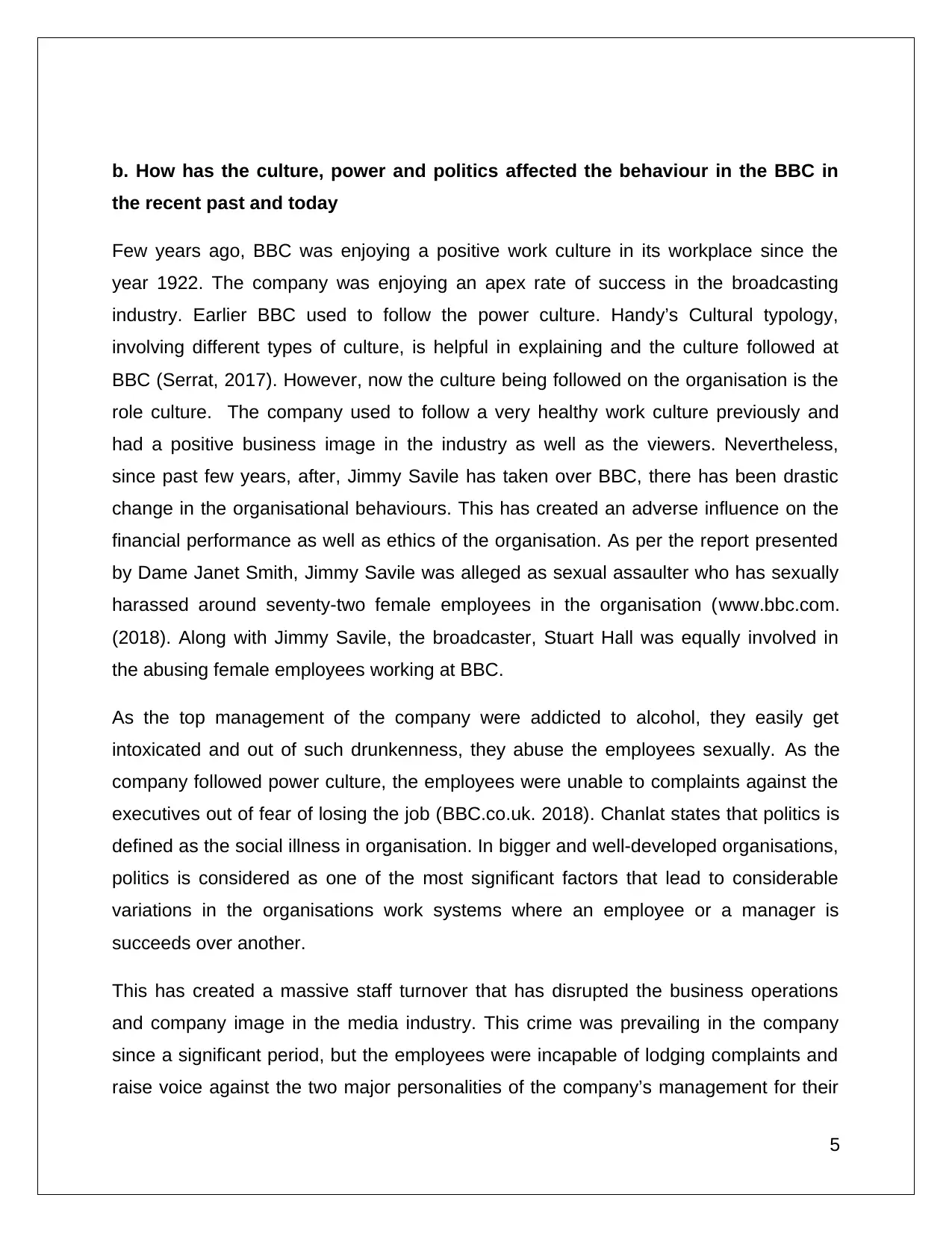
b. How has the culture, power and politics affected the behaviour in the BBC in
the recent past and today
Few years ago, BBC was enjoying a positive work culture in its workplace since the
year 1922. The company was enjoying an apex rate of success in the broadcasting
industry. Earlier BBC used to follow the power culture. Handy’s Cultural typology,
involving different types of culture, is helpful in explaining and the culture followed at
BBC (Serrat, 2017). However, now the culture being followed on the organisation is the
role culture. The company used to follow a very healthy work culture previously and
had a positive business image in the industry as well as the viewers. Nevertheless,
since past few years, after, Jimmy Savile has taken over BBC, there has been drastic
change in the organisational behaviours. This has created an adverse influence on the
financial performance as well as ethics of the organisation. As per the report presented
by Dame Janet Smith, Jimmy Savile was alleged as sexual assaulter who has sexually
harassed around seventy-two female employees in the organisation (www.bbc.com.
(2018). Along with Jimmy Savile, the broadcaster, Stuart Hall was equally involved in
the abusing female employees working at BBC.
As the top management of the company were addicted to alcohol, they easily get
intoxicated and out of such drunkenness, they abuse the employees sexually. As the
company followed power culture, the employees were unable to complaints against the
executives out of fear of losing the job (BBC.co.uk. 2018). Chanlat states that politics is
defined as the social illness in organisation. In bigger and well-developed organisations,
politics is considered as one of the most significant factors that lead to considerable
variations in the organisations work systems where an employee or a manager is
succeeds over another.
This has created a massive staff turnover that has disrupted the business operations
and company image in the media industry. This crime was prevailing in the company
since a significant period, but the employees were incapable of lodging complaints and
raise voice against the two major personalities of the company’s management for their
5
the recent past and today
Few years ago, BBC was enjoying a positive work culture in its workplace since the
year 1922. The company was enjoying an apex rate of success in the broadcasting
industry. Earlier BBC used to follow the power culture. Handy’s Cultural typology,
involving different types of culture, is helpful in explaining and the culture followed at
BBC (Serrat, 2017). However, now the culture being followed on the organisation is the
role culture. The company used to follow a very healthy work culture previously and
had a positive business image in the industry as well as the viewers. Nevertheless,
since past few years, after, Jimmy Savile has taken over BBC, there has been drastic
change in the organisational behaviours. This has created an adverse influence on the
financial performance as well as ethics of the organisation. As per the report presented
by Dame Janet Smith, Jimmy Savile was alleged as sexual assaulter who has sexually
harassed around seventy-two female employees in the organisation (www.bbc.com.
(2018). Along with Jimmy Savile, the broadcaster, Stuart Hall was equally involved in
the abusing female employees working at BBC.
As the top management of the company were addicted to alcohol, they easily get
intoxicated and out of such drunkenness, they abuse the employees sexually. As the
company followed power culture, the employees were unable to complaints against the
executives out of fear of losing the job (BBC.co.uk. 2018). Chanlat states that politics is
defined as the social illness in organisation. In bigger and well-developed organisations,
politics is considered as one of the most significant factors that lead to considerable
variations in the organisations work systems where an employee or a manager is
succeeds over another.
This has created a massive staff turnover that has disrupted the business operations
and company image in the media industry. This crime was prevailing in the company
since a significant period, but the employees were incapable of lodging complaints and
raise voice against the two major personalities of the company’s management for their
5
⊘ This is a preview!⊘
Do you want full access?
Subscribe today to unlock all pages.

Trusted by 1+ million students worldwide
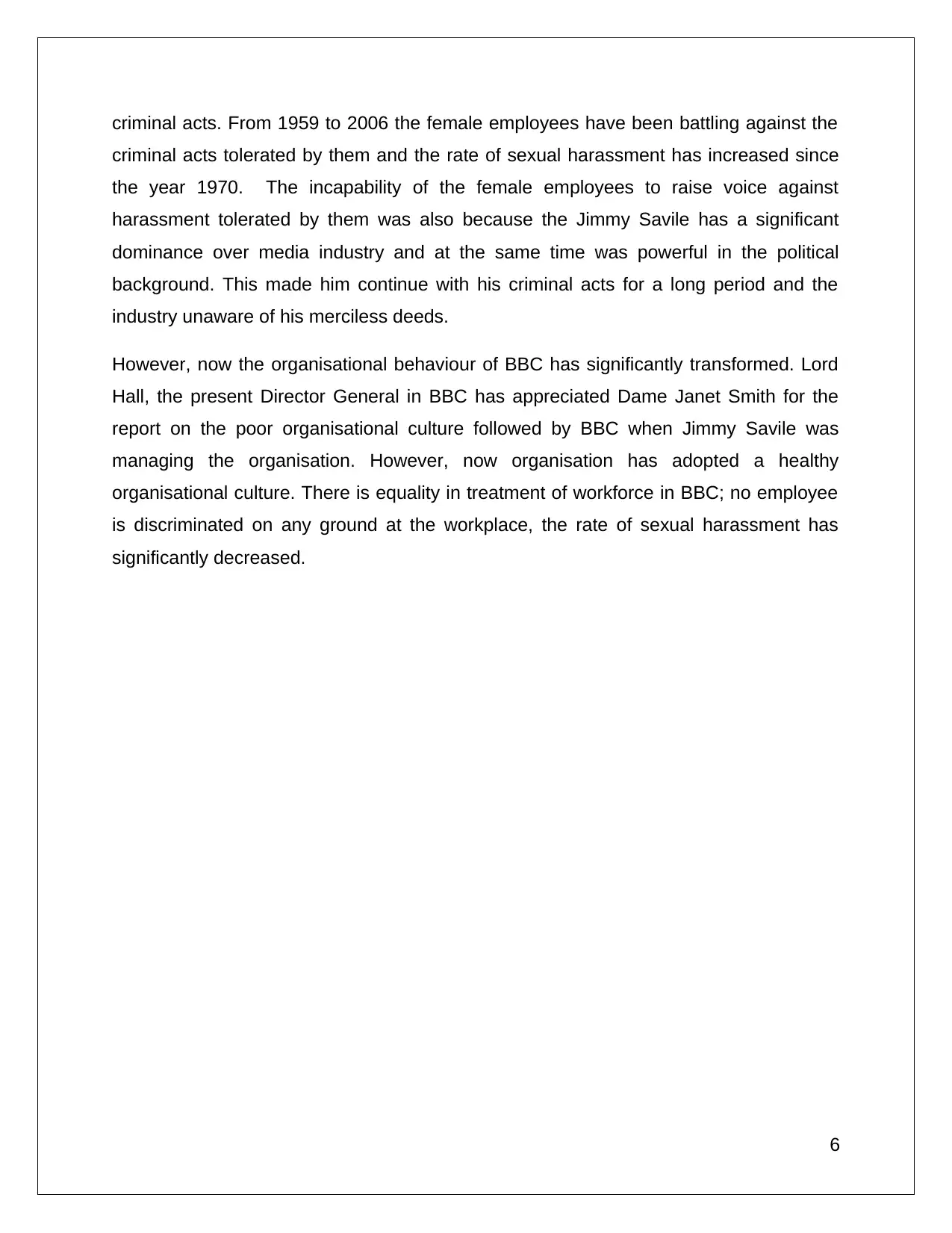
criminal acts. From 1959 to 2006 the female employees have been battling against the
criminal acts tolerated by them and the rate of sexual harassment has increased since
the year 1970. The incapability of the female employees to raise voice against
harassment tolerated by them was also because the Jimmy Savile has a significant
dominance over media industry and at the same time was powerful in the political
background. This made him continue with his criminal acts for a long period and the
industry unaware of his merciless deeds.
However, now the organisational behaviour of BBC has significantly transformed. Lord
Hall, the present Director General in BBC has appreciated Dame Janet Smith for the
report on the poor organisational culture followed by BBC when Jimmy Savile was
managing the organisation. However, now organisation has adopted a healthy
organisational culture. There is equality in treatment of workforce in BBC; no employee
is discriminated on any ground at the workplace, the rate of sexual harassment has
significantly decreased.
6
criminal acts tolerated by them and the rate of sexual harassment has increased since
the year 1970. The incapability of the female employees to raise voice against
harassment tolerated by them was also because the Jimmy Savile has a significant
dominance over media industry and at the same time was powerful in the political
background. This made him continue with his criminal acts for a long period and the
industry unaware of his merciless deeds.
However, now the organisational behaviour of BBC has significantly transformed. Lord
Hall, the present Director General in BBC has appreciated Dame Janet Smith for the
report on the poor organisational culture followed by BBC when Jimmy Savile was
managing the organisation. However, now organisation has adopted a healthy
organisational culture. There is equality in treatment of workforce in BBC; no employee
is discriminated on any ground at the workplace, the rate of sexual harassment has
significantly decreased.
6
Paraphrase This Document
Need a fresh take? Get an instant paraphrase of this document with our AI Paraphraser
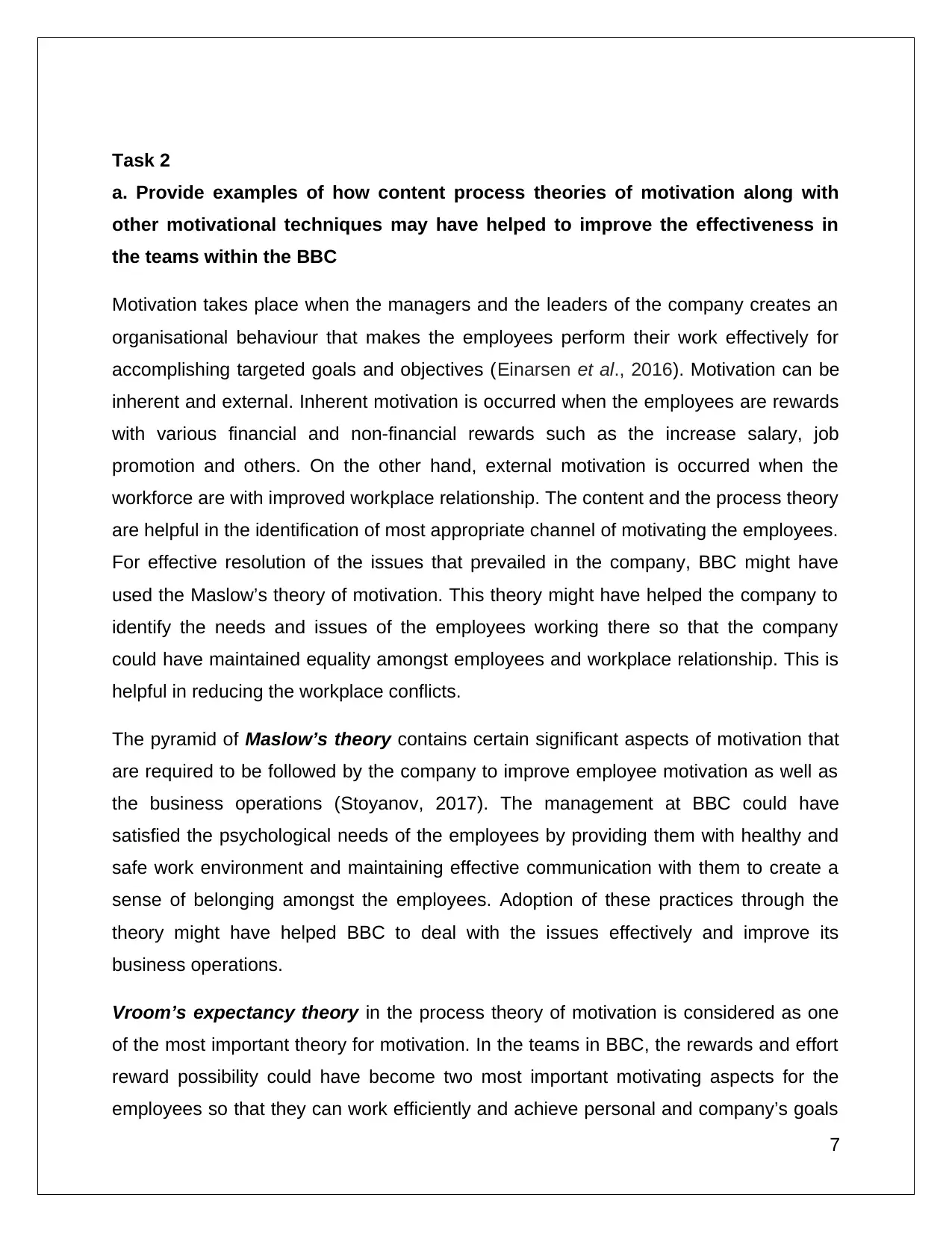
Task 2
a. Provide examples of how content process theories of motivation along with
other motivational techniques may have helped to improve the effectiveness in
the teams within the BBC
Motivation takes place when the managers and the leaders of the company creates an
organisational behaviour that makes the employees perform their work effectively for
accomplishing targeted goals and objectives (Einarsen et al., 2016). Motivation can be
inherent and external. Inherent motivation is occurred when the employees are rewards
with various financial and non-financial rewards such as the increase salary, job
promotion and others. On the other hand, external motivation is occurred when the
workforce are with improved workplace relationship. The content and the process theory
are helpful in the identification of most appropriate channel of motivating the employees.
For effective resolution of the issues that prevailed in the company, BBC might have
used the Maslow’s theory of motivation. This theory might have helped the company to
identify the needs and issues of the employees working there so that the company
could have maintained equality amongst employees and workplace relationship. This is
helpful in reducing the workplace conflicts.
The pyramid of Maslow’s theory contains certain significant aspects of motivation that
are required to be followed by the company to improve employee motivation as well as
the business operations (Stoyanov, 2017). The management at BBC could have
satisfied the psychological needs of the employees by providing them with healthy and
safe work environment and maintaining effective communication with them to create a
sense of belonging amongst the employees. Adoption of these practices through the
theory might have helped BBC to deal with the issues effectively and improve its
business operations.
Vroom’s expectancy theory in the process theory of motivation is considered as one
of the most important theory for motivation. In the teams in BBC, the rewards and effort
reward possibility could have become two most important motivating aspects for the
employees so that they can work efficiently and achieve personal and company’s goals
7
a. Provide examples of how content process theories of motivation along with
other motivational techniques may have helped to improve the effectiveness in
the teams within the BBC
Motivation takes place when the managers and the leaders of the company creates an
organisational behaviour that makes the employees perform their work effectively for
accomplishing targeted goals and objectives (Einarsen et al., 2016). Motivation can be
inherent and external. Inherent motivation is occurred when the employees are rewards
with various financial and non-financial rewards such as the increase salary, job
promotion and others. On the other hand, external motivation is occurred when the
workforce are with improved workplace relationship. The content and the process theory
are helpful in the identification of most appropriate channel of motivating the employees.
For effective resolution of the issues that prevailed in the company, BBC might have
used the Maslow’s theory of motivation. This theory might have helped the company to
identify the needs and issues of the employees working there so that the company
could have maintained equality amongst employees and workplace relationship. This is
helpful in reducing the workplace conflicts.
The pyramid of Maslow’s theory contains certain significant aspects of motivation that
are required to be followed by the company to improve employee motivation as well as
the business operations (Stoyanov, 2017). The management at BBC could have
satisfied the psychological needs of the employees by providing them with healthy and
safe work environment and maintaining effective communication with them to create a
sense of belonging amongst the employees. Adoption of these practices through the
theory might have helped BBC to deal with the issues effectively and improve its
business operations.
Vroom’s expectancy theory in the process theory of motivation is considered as one
of the most important theory for motivation. In the teams in BBC, the rewards and effort
reward possibility could have become two most important motivating aspects for the
employees so that they can work efficiently and achieve personal and company’s goals
7
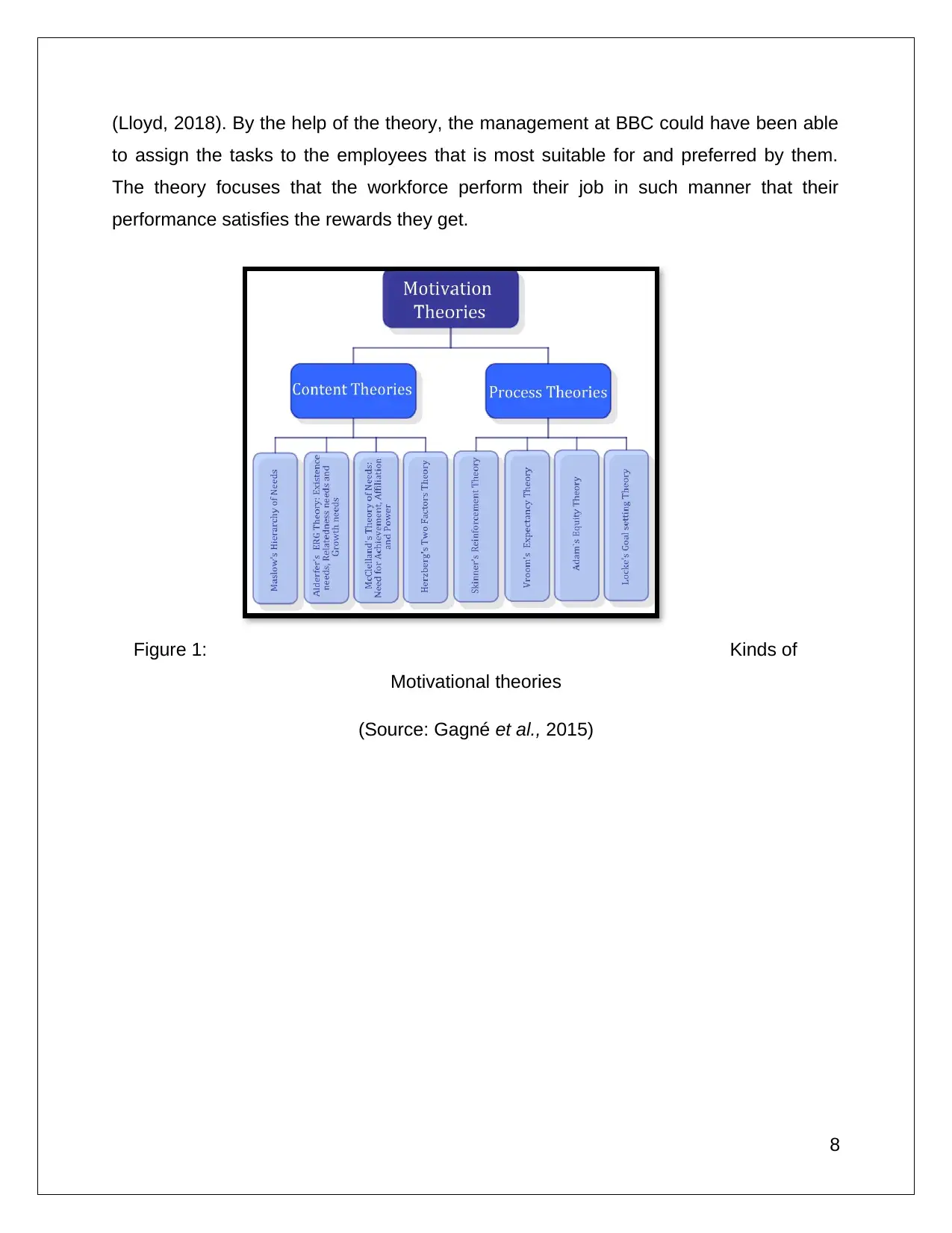
(Lloyd, 2018). By the help of the theory, the management at BBC could have been able
to assign the tasks to the employees that is most suitable for and preferred by them.
The theory focuses that the workforce perform their job in such manner that their
performance satisfies the rewards they get.
Figure 1: Kinds of
Motivational theories
(Source: Gagné et al., 2015)
8
to assign the tasks to the employees that is most suitable for and preferred by them.
The theory focuses that the workforce perform their job in such manner that their
performance satisfies the rewards they get.
Figure 1: Kinds of
Motivational theories
(Source: Gagné et al., 2015)
8
⊘ This is a preview!⊘
Do you want full access?
Subscribe today to unlock all pages.

Trusted by 1+ million students worldwide
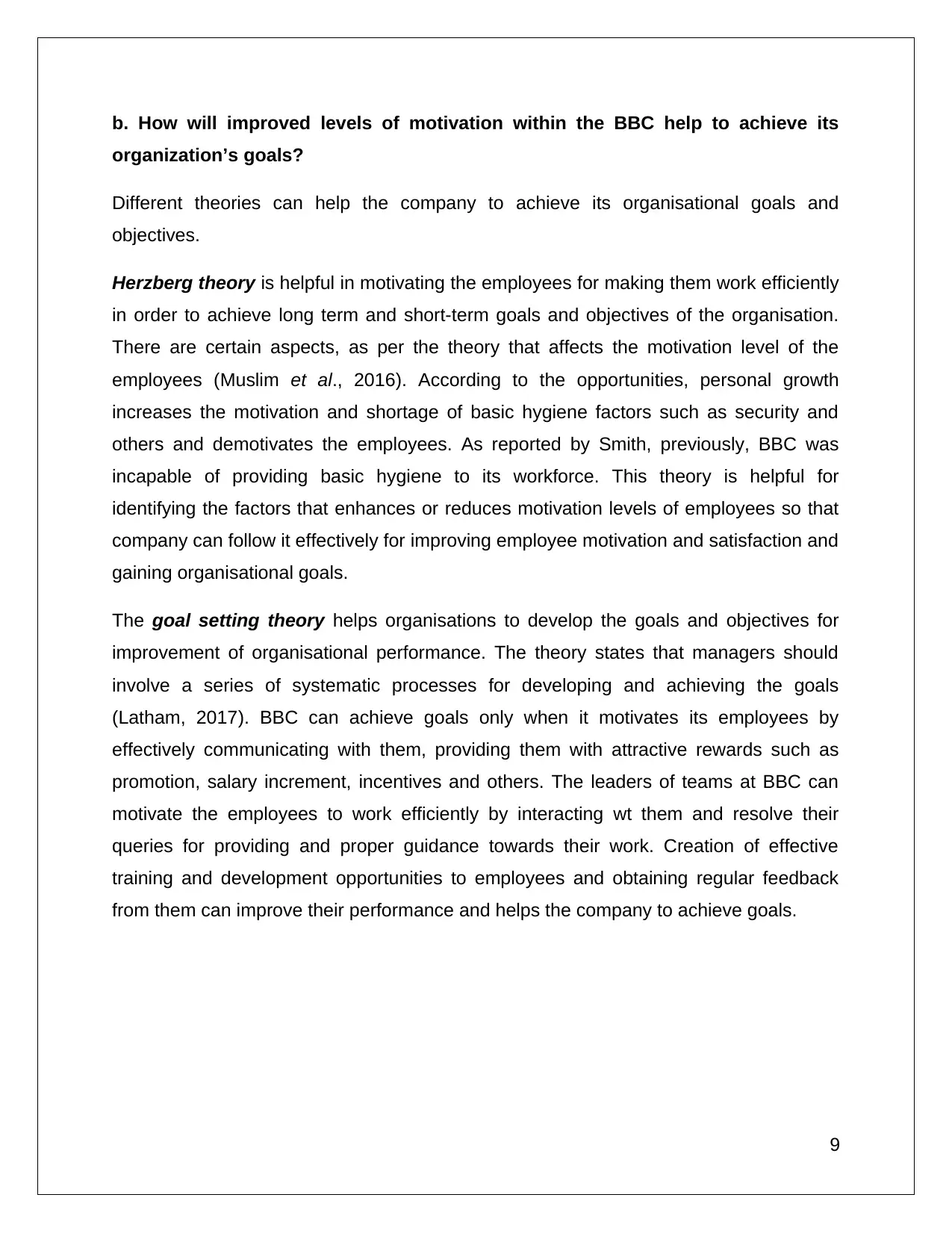
b. How will improved levels of motivation within the BBC help to achieve its
organization’s goals?
Different theories can help the company to achieve its organisational goals and
objectives.
Herzberg theory is helpful in motivating the employees for making them work efficiently
in order to achieve long term and short-term goals and objectives of the organisation.
There are certain aspects, as per the theory that affects the motivation level of the
employees (Muslim et al., 2016). According to the opportunities, personal growth
increases the motivation and shortage of basic hygiene factors such as security and
others and demotivates the employees. As reported by Smith, previously, BBC was
incapable of providing basic hygiene to its workforce. This theory is helpful for
identifying the factors that enhances or reduces motivation levels of employees so that
company can follow it effectively for improving employee motivation and satisfaction and
gaining organisational goals.
The goal setting theory helps organisations to develop the goals and objectives for
improvement of organisational performance. The theory states that managers should
involve a series of systematic processes for developing and achieving the goals
(Latham, 2017). BBC can achieve goals only when it motivates its employees by
effectively communicating with them, providing them with attractive rewards such as
promotion, salary increment, incentives and others. The leaders of teams at BBC can
motivate the employees to work efficiently by interacting wt them and resolve their
queries for providing and proper guidance towards their work. Creation of effective
training and development opportunities to employees and obtaining regular feedback
from them can improve their performance and helps the company to achieve goals.
9
organization’s goals?
Different theories can help the company to achieve its organisational goals and
objectives.
Herzberg theory is helpful in motivating the employees for making them work efficiently
in order to achieve long term and short-term goals and objectives of the organisation.
There are certain aspects, as per the theory that affects the motivation level of the
employees (Muslim et al., 2016). According to the opportunities, personal growth
increases the motivation and shortage of basic hygiene factors such as security and
others and demotivates the employees. As reported by Smith, previously, BBC was
incapable of providing basic hygiene to its workforce. This theory is helpful for
identifying the factors that enhances or reduces motivation levels of employees so that
company can follow it effectively for improving employee motivation and satisfaction and
gaining organisational goals.
The goal setting theory helps organisations to develop the goals and objectives for
improvement of organisational performance. The theory states that managers should
involve a series of systematic processes for developing and achieving the goals
(Latham, 2017). BBC can achieve goals only when it motivates its employees by
effectively communicating with them, providing them with attractive rewards such as
promotion, salary increment, incentives and others. The leaders of teams at BBC can
motivate the employees to work efficiently by interacting wt them and resolve their
queries for providing and proper guidance towards their work. Creation of effective
training and development opportunities to employees and obtaining regular feedback
from them can improve their performance and helps the company to achieve goals.
9
Paraphrase This Document
Need a fresh take? Get an instant paraphrase of this document with our AI Paraphraser
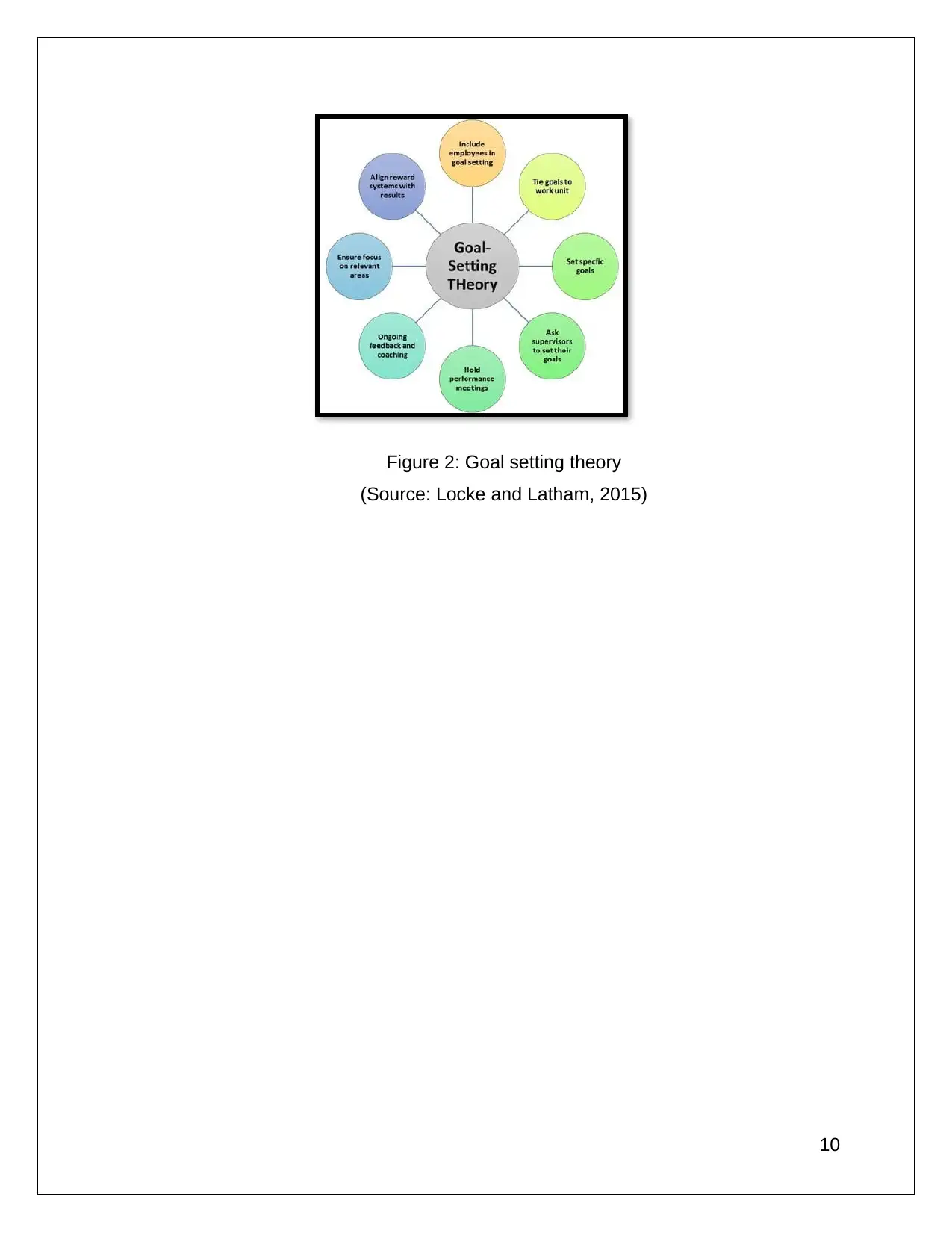
Figure 2: Goal setting theory
(Source: Locke and Latham, 2015)
10
(Source: Locke and Latham, 2015)
10
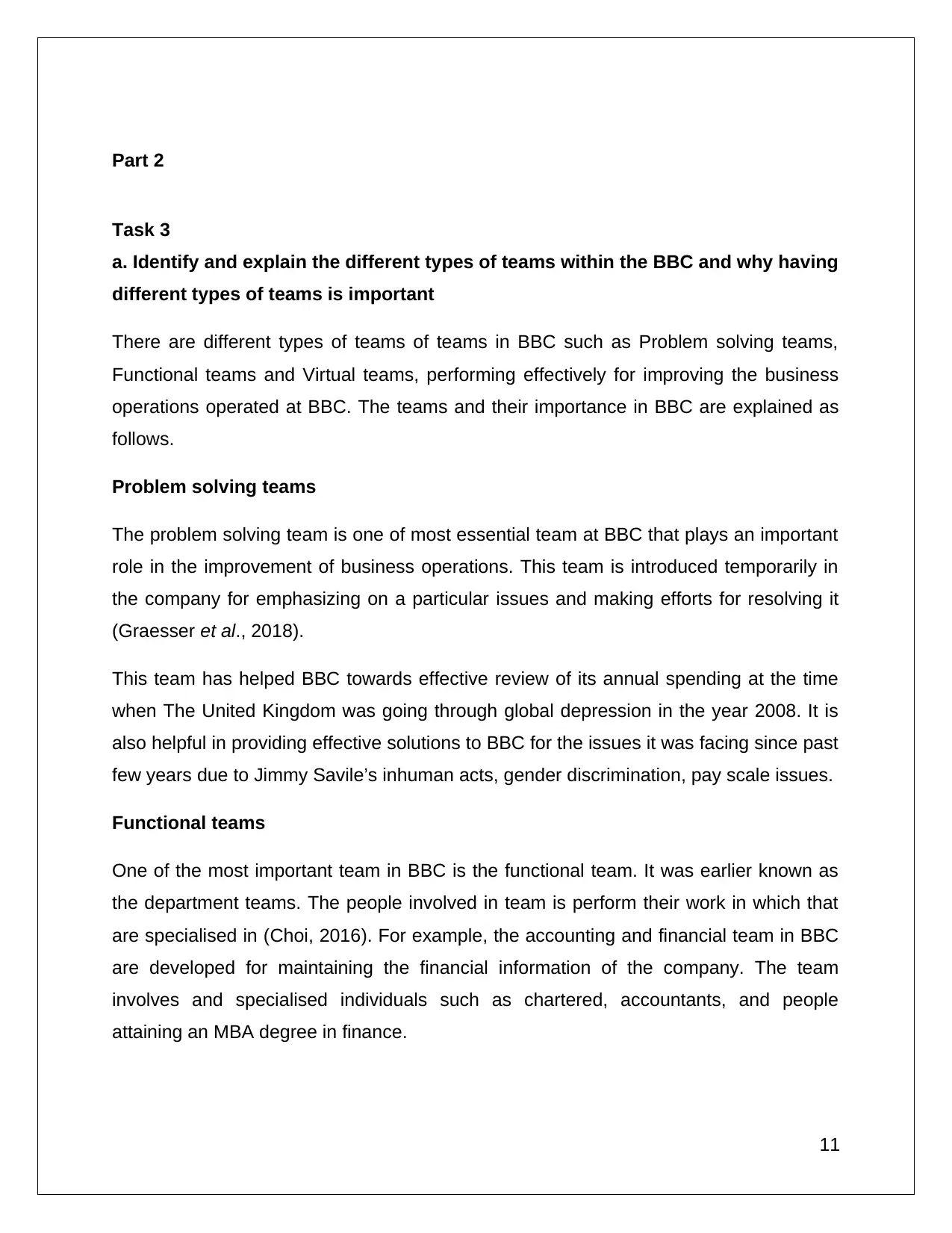
Part 2
Task 3
a. Identify and explain the different types of teams within the BBC and why having
different types of teams is important
There are different types of teams of teams in BBC such as Problem solving teams,
Functional teams and Virtual teams, performing effectively for improving the business
operations operated at BBC. The teams and their importance in BBC are explained as
follows.
Problem solving teams
The problem solving team is one of most essential team at BBC that plays an important
role in the improvement of business operations. This team is introduced temporarily in
the company for emphasizing on a particular issues and making efforts for resolving it
(Graesser et al., 2018).
This team has helped BBC towards effective review of its annual spending at the time
when The United Kingdom was going through global depression in the year 2008. It is
also helpful in providing effective solutions to BBC for the issues it was facing since past
few years due to Jimmy Savile’s inhuman acts, gender discrimination, pay scale issues.
Functional teams
One of the most important team in BBC is the functional team. It was earlier known as
the department teams. The people involved in team is perform their work in which that
are specialised in (Choi, 2016). For example, the accounting and financial team in BBC
are developed for maintaining the financial information of the company. The team
involves and specialised individuals such as chartered, accountants, and people
attaining an MBA degree in finance.
11
Task 3
a. Identify and explain the different types of teams within the BBC and why having
different types of teams is important
There are different types of teams of teams in BBC such as Problem solving teams,
Functional teams and Virtual teams, performing effectively for improving the business
operations operated at BBC. The teams and their importance in BBC are explained as
follows.
Problem solving teams
The problem solving team is one of most essential team at BBC that plays an important
role in the improvement of business operations. This team is introduced temporarily in
the company for emphasizing on a particular issues and making efforts for resolving it
(Graesser et al., 2018).
This team has helped BBC towards effective review of its annual spending at the time
when The United Kingdom was going through global depression in the year 2008. It is
also helpful in providing effective solutions to BBC for the issues it was facing since past
few years due to Jimmy Savile’s inhuman acts, gender discrimination, pay scale issues.
Functional teams
One of the most important team in BBC is the functional team. It was earlier known as
the department teams. The people involved in team is perform their work in which that
are specialised in (Choi, 2016). For example, the accounting and financial team in BBC
are developed for maintaining the financial information of the company. The team
involves and specialised individuals such as chartered, accountants, and people
attaining an MBA degree in finance.
11
⊘ This is a preview!⊘
Do you want full access?
Subscribe today to unlock all pages.

Trusted by 1+ million students worldwide
1 out of 20
Related Documents
Your All-in-One AI-Powered Toolkit for Academic Success.
+13062052269
info@desklib.com
Available 24*7 on WhatsApp / Email
![[object Object]](/_next/static/media/star-bottom.7253800d.svg)
Unlock your academic potential
Copyright © 2020–2026 A2Z Services. All Rights Reserved. Developed and managed by ZUCOL.





